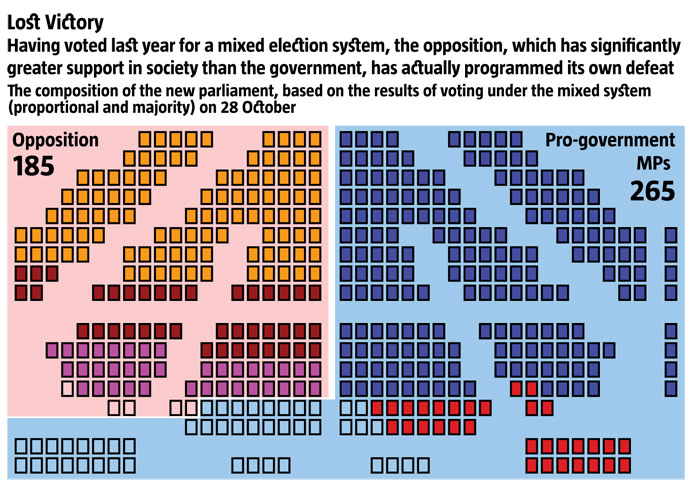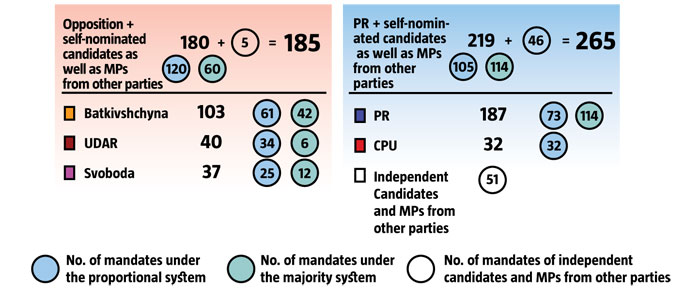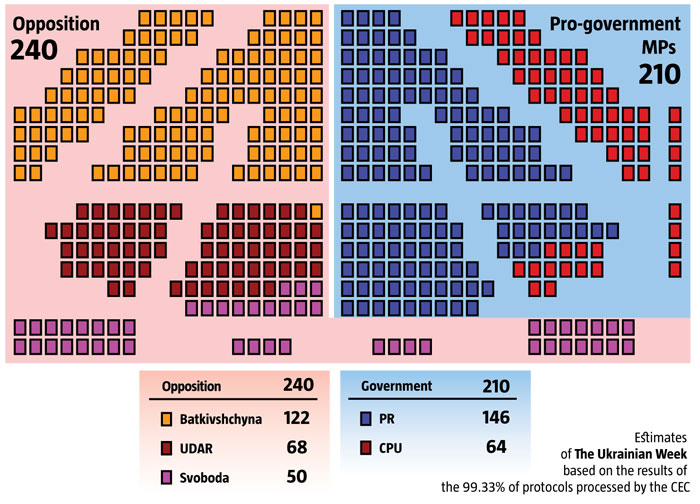Representatives of most influential international organizations, who observed the election in Ukraine, noted that this year’s parliamentary election was accompanied by mass violations, and has thus become the latest step away from democracy. They are refraining from making final evaluations until the completion of the vote counting process, both under the proportional and the first-past-the-post (FPTP) systems. Meanwhile, the Ukrainian government is actively working to legitimize the results of the will of the people, referring to the fact that under the proportional component, they almost correspond with exit poll data. Based on this, Mykola Azarov even spoke about the “classic free and democratic elections that have taken place”.
However, in fact, the election testified to the exact opposite: civilized mechanisms for the renewal of the representative body in accordance with the public disposition in the state, remain blocked, even though that is the purpose of parliamentary elections in democratic countries.
First of all, even under party lists, the preliminary data of the Central Election Commission (CEC) differs significantly from the data of exit polls and the parallel counting of votes by various opposition forces. There are two obvious disparities: the significantly understated result of the opposition party, Svoboda, and the overstated result of the Communist Party of Ukraine (CPU), an ally of the Party of Regions (PR) under the currently ruling coalition in Ukraine. PR’s result is somewhat higher, while that of UDAR is somewhat lower, than indicated in the parallel counting of votes by opposition forces and the results of most exit polls.
However, voting under party lists attested to the government’s defeat, although it was not as significant as it could have been if equal conditions had been provided to all campaign participants; Yulia Tymoshenko had not been imprisoned; opposition political forces had had free access to the mass media; and the PR had not applied an extensive arsenal of means to distort the voters' dispositions in its favour during the pre-election campaign and domination at election commissions at all levels, as well as diverse violations during voting, which will obviously affect the result.
According to preliminary CEC data, PR has achieved the lowest percentage it has ever had – 30% of votes (the National Exit Poll gave it 28.1%) versus 34% in 2007 and 32% in 2006. On the other hand, three opposition forces, who made it into parliament, collectively gained a much better outcome than the party in power. PR’s allies under the current parliamentary coalition – the CPU – obtained 13%, but only because they were able to persuade their voters that they would allegedly truly oppose the Yanukovych regime.
THE DISCRIMINATION OF THE MAJORITY
In spite of the unequivocal public vote of no confidence, the Presidential Administration will once more be able to create a loyal majority in parliament, due to the distortion of the electoral disposition in FPTP districts, and subsequently, the agony of the Yanukovych will continue until the presidential election.
The defective law on elections played a key role in this, since it did not provide for voting in FPTP districts in two rounds, as is the case in most civilized countries with a mixed election system. As a result, having attained about 28% of the vote (according to the exit poll conducted for the Inter and ICTV TV channels) on 28 October, PR candidates obtained mandates in most FPTP districts. This shows that the gap in the proportional and FPTP vote outcome for a given party has nothing to do with the assumption that the party may be unpopular in a given district, while its candidate is popular there – as the widespread stereotype has it. When “popular candidates”, who have the support of 28% of voters, gain more than half of all the mandates, this is evidence that the system ensures an unprecedented distortion of electoral dispositions and deprives the absolute majority of citizens of the right to choose the representatives they prefer at the Verkhovna Rada. After all, 20-30% of those who participated in the voting or just 10-15% of all registered voters was quite enough in a number of districts for a given candidate to win.
However, even this insignificant percentage was reached with large-scale manipulation in a number of cases. These included the absurd division of districts in favour of a specifically determined progovernment candidate, bribery, unequal access to voters, pressure on the competition and other signs of an unfair pre-election campaign, as well as during the voting and vote-counting at polling stations. The essence of the idea of on-line observation at the polling stations was completely wiped out, since the subsequent counting at polling stations and DECs had no video monitoring, while a series of scandals in a number of districts showed that it was these processes that should have been monitored. As a result of the constant clarification and rewriting of the protocols the CEC had not even received preliminary results two days after the conclusion of voting.
EVERYTHING OR NOTHING
Having taken advantage of control over the majority of polling station members and the support of administrative resources, pro-government candidates decided to win at all cost in a number of districts, or sabotage the election, guided by the “if I can’t have it, neither can anyone else” rule. The most problematic, were ten districts in Kyiv and adjoining regions of the oblast (District Nos. 211, 214, 215, 216, 217, 223 and Nos. 90, 91, 95, 97), as well as at least eight in the regions: in the Cherkasy (Nos. 194 and 197), Vinnytsia (No. 11), Zhytomyr (No. 67), Kirovohrad (No. 101), Mykolayiv (No. 132), Kherson (No. 182), Luhansk (No. 104) and other oblasts. Because of the threat of the defeat of progovernment candidates there, vote-counting was blocked for a considerable amount of time, using various means. Meanwhile, representatives of opposition single candidates signaled that the falsification of results was taking place.
According to a Batkivshchyna report, after it became clear that its candidate had won in District No. 197 in Cherkasy Oblast, Bohdan Hubsky, the pro-government self-nominated candidate, arrived at the DEC and provoked the suspension of its work, in order to sabotage the election. “Electricity disappeared on the premises, three commission members were taken to hospital, and seven others simply fled from the DEC,” stated the announcement from the Batkivshchyna press-service. As a result, no quorum was possible. When the likelihood of the victory of Batkivshchyna's Ksenia Lyapina was clear in District No. 216, the head of one polling station disappeared with the seal and protocols. The confrontation and blocking of the work of DECs was equally acute in districts where opposition candidates were winning in Kyiv Oblast and in Kyiv itself. Oleh Tiahnybok stated that “the government is trying to steal every third vote cast in favour of Svoboda and every third district, where the election was won by a Svoboda candidate.” The party’s preliminary results, as announced on the CEC website, indeed appeared significantly lower than in the results of the exit poll and parallel vote-counting, conducted by various opposition parties. Meanwhile, according to Svoboda, in two districts in Kyiv and Khmelnytsk Oblasts, information was forwarded to the CEC, that contradicted the parallel counting of the party’s votes, based on the protocols with original ink seals from the polling station and ensured a minimal advantage (in the number of votes) for pro-government candidates. Svoboda also experienced a similar problem in two Kyiv districts. For example, during a verification of the results, it was established that the results of its candidate, Andriy Illyenko, who was a candidate in District No. 215, at one of the polling stations, was attributed to his rival, the Secretary of the Kyiv City Council and owner of the Epicentre chain, Halyna Hereha.
While it was possible to defend the victories of opposition candidates in most cases in Kyiv, in many oblasts, where the opposition had won a convincing victory under party lists, the victory of pro-government candidates was nevertheless announced, and where it proved impossible to reach such a goal, the counting of votes was literally blocked. In a number of cases, this provoked actions on the part of the supporters of the candidates, who considered themselves to be the victims of falsification. For example, in Nova Kakhovka, people took DEC No. 184 by storm, demanding that legitimate re-count of the protocols, under which PR's Mykola Dmytruk allegedly won, be conducted, while popular local self-nominated candidate, Ivan Vynnyk, obtained only 100 votes less. After this, the Head of the Commission and several of its members tried to escape, in order to prevent the re-count.
Mykola Tomenko, one of the leaders of Batkivshchyna, announced that on 29 October, the Heads of Oblast State Administrations (who also hold the office of Heads of PR Oblast Election Headquarters) instructed representatives of oblast state administrations and the heads of regional administrations to put pressure on members of DECs and polling stations to change already counted protocols to new ones, which contained the figures they preferred. The situation in District No. 132 in Mykolayiv Oblast, where “Berkut”, a special force unit, stormed the DEC, after which the previous results of the counting of 100% of votes, which determined Batkivshchyna's Arkadiy Kornatskiy as the winner, was reversed, in favour of PR's Vitaliy Travyanko. Batkivshchyna also reported the attempt to apply a similar scheme in District No. 130 (also in Mykolayiv Oblast), where its single candidate, Ihor Brychenko won over Felix Olshevskiy (PR). The result in District No. 14 in Vinnytsia also changed radically, where on the morning of 31 October, after the counting of 100% of the protocols, Batkivshchyna's Ivan Melnychuk won, and during the day, the victory of self-nominated candidate, Viktor Zherebniuk, was announced.
The pro-government selfnominated candidates, who failed to achieve a review of the results of the election in their favour in the DECs, decided to turn to the “independent” court. These are the means taken by Tetiana Zasukha, the wife of the odious former head of the Kyiv Oblast during the Kuchma era, who filed a claim for the recognition of the invalidity of voting at districts, where Viktor Romaniuk, the Batkivshchyna candidate, won.
DEFEAT AT THEIR FAULT
The sensation of this election was not only the unexpected high result of Svoboda (which the majority of the population considered to be one that is unlikely to cooperate with the government), but also a signal from society to the politicians for the latter to stop underestimating it. Large-scale manipulations, particularly the publication of clearly customized opinion polls by respected sociological services and the pressure of administrative resources raised doubts among a significant amount of politicians and experts as to the ability to counteract such pressure. The opposition virtually ignored districts in Central and Southern Ukraine. A lot of candidates were nominated there, who had neither the chance, nor the will to win. However, the results of voting confirmed a well-known truth that he who tries, will overcome. This was not only the case for Svoboda, which gained almost twice as many votes in regions that were new to it, than in the previous election, but also for a number of opposition candidates in districts, which they had already given up on (districts where candidates included Oles Dovhiy, Halyna Hareha and Viktor Pylypyshyn in Kyiv, FPTP districts in Vinnytsia, Cherkasy, Poltava, Sumy, Kirovohrad, Mykolayiv and Kherson Oblasts). Quite high results were also attained under the party lists of opposition forces in the South East (Dnipropetrovsk, Kherson, Mykolayiv and even Kharkiv and Odesa Oblasts), where in aggregate, they were snapping at the heels of the PR.
At the same time, because of mistakes made during the determination of candidates, also as a result of the passivity of the latter and the lack of systematic work with voters, the opposition lost a significant amount of seats in parliament, which gave grounds, in some cases, to talk about a lack of wish to win. This is evidenced by the fact that the rating of the United Opposition, Svoboda and UDAR candidates in a number of districts in Central and Northern Ukraine is significantly lower than that of the party they represent.
The lack of agreements among the major opposition forces on the removal of less popular candidates in favour of one another also had a negative impact in their results in the districts, where pro-government candidates had been likely to win. If Batkivshchyna, UDAR and Svoboda had come to an agreement, their chances to gain several dozen extra districts would have soared. This could have been done in all South-Eastern regions. An analysis of published preliminary CEC data shows that in this case, opposition candidates could easily have won at the very least in Districts No. 182 and 184 in Kherson Oblast, District No. 132 in Mykolayiv Oblast and District No. 82 in Zaporizhzhia Oblast. In Central Ukraine, the timely removal of a less popular single candidate could have ensured victory in District No. 66 in Zhytomyr Oblast, District No. 96 in Kyiv Oblast, District Nos. 100 and 102 in Kirovohrad Oblast and District No. 199 in Cherkasy Oblast.
It was because of the lack of an agreed candidate that the opposition forces virtually lost in the entire Khmelnytsk Oblast. A single candidate representing all three main opposition forces would also have won in District Nos. 20 and 21 in Volyn, District No. 155 in Rivne Oblast and District No. 87 in the Ivano-Frankivsk Oblast.
Overall, this makes at least 16 districts, where together, candidates from the three opposition forces which had crossed the parliamentary threshold gained significantly more votes than the pro-government candidates, which according to preliminary CEC data, won in the relevant districts.
Meanwhile, there is the impression that after the parliamentary election, opposition parties are being drawn more actively into conflicts between themselves. This was reflected after the break-down of agreements on the mutual agreement of candidates in FPTP districts. In this case, the core of the contention was District No. 95 in Irpin, where, after the publication of the exit poll, when it became clear that the pro-government self nominated candidate, Petro Melnyk would not win, a battle began between the candidates from Batkivshchyna and UDAR, who, according to exit poll data, had attained first and second place. Batkivshchyna accused UDAR of playing up to Petro Melnyk, while he, in turn, responded that there was no such threat any more, and that it was necessary to establish which of the opposition candidates had actually won. Bearing the latest announcements in mind, pro-government candidates decided to take advantage of the Irpin precedent in their own interests, at the same time, heating up conflicts between opposition forces. UDAR gave information on a provocation that was discovered in District No. 223, where self-nominated Viktor Pylypyshyn was running against Svoboda candidate, Yuriy Levchenko. On 31 October, two young men with IDs that were allegedly from the UDAR party newspaper, came to the District Election Commission and started to provoke a conflict with Svoboda representatives. When demanded to present their ID documents, and after phone calls were made to the leadership of Klitschko’s political force, they quickly disappeared.



VICTORY, REALLY?
In spite of everything, PR was unable to win more mandates than it has in the current parliament, even notwithstanding the application of the FPTP system and will have 186–187 mandates. They will obviously compensate their shortages with pseudo-independent self-nominated candidates and crossovers from opposition forces. However, there is a fundamental difference from the 2010 election – the awareness of the fact that the Yanukovych regime is in agony. This is why the results of this election will be tricoloured and parliament will be composed of pro-government MPs, those from the opposition and representatives of the “mud”. The latter will be guided by personal and business interests, as well as the instinct for self-preservation, which will determine which course they follow. Among the self-nominated candidates that made it into parliament, there is an element of those, who under current conditions, could try to play their own game and display resistance to pressure from the party in power. Under certain conditions, they could distance themselves from the pro-government majority. Traditionally, such a scenario is considered to be the most likely one – closer to the 2015 presidential election, as was the case in 2004. However, in fact, this process will be related to the situation, whereby the balance will tip in the opposite direction from the current centre for approving decisions in Ukraine, as opposed to the date.
This is why, in spite of the clear distortion of the will of most Ukrainians, the chances for the opposition will largely depend on the ability to join efforts to protect election results and avoid battles for mutual destruction, such as those between Yulia Tymoshenko, Viktor Yushchenko and Arseniy Yatseniuk during the previous presidential election campaign. After all, the presidential race has clearly begun.

